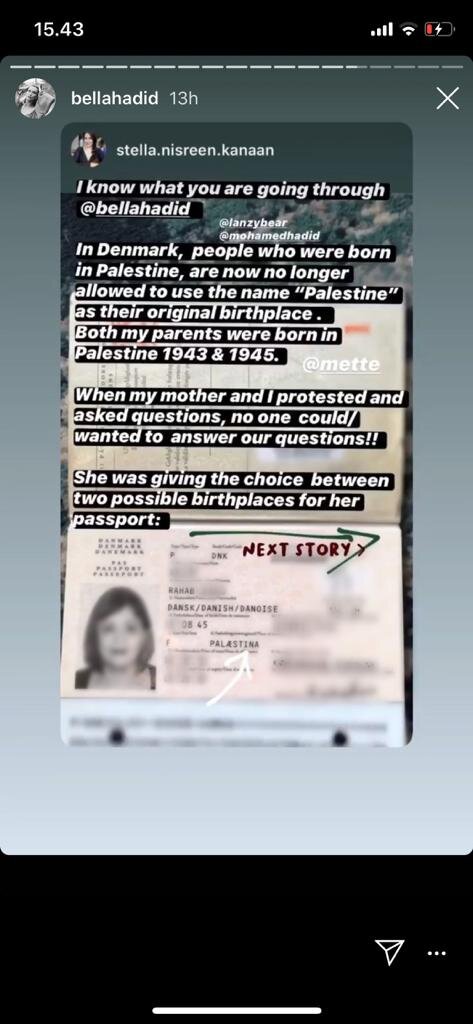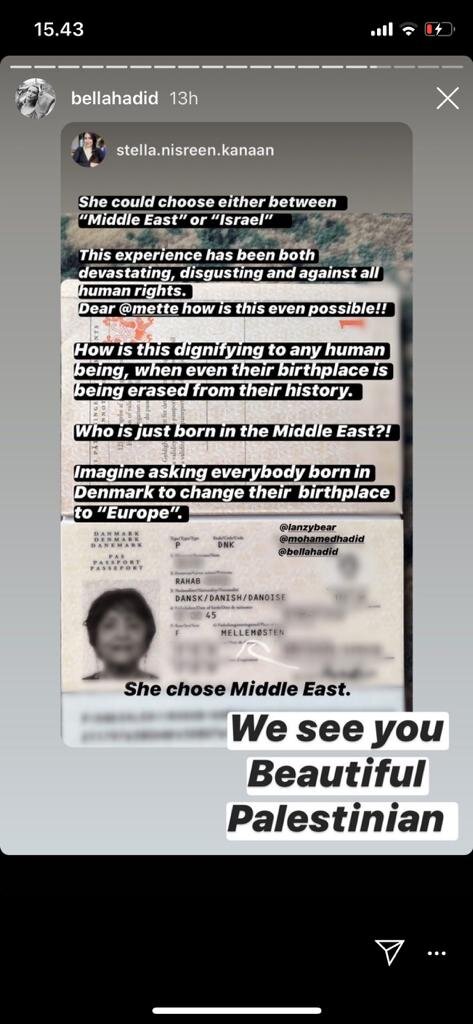Palestinian-Danish Mother and Daughter Open Up About Systematic Erasure
Written by: Huda Z
“You can choose between Israel or the Middle East.”
When the seventy-five year-old PhD researcher was told that she couldn’t mention “Palestine” as her birthplace in her new passport last year, she was so devastated that she went home without even applying.
“She didn’t continue applying, because we couldn’t believe it. We couldn’t believe it even was true, and we couldn’t believe that the Middle East was even an option – that’s not even a country,” her daughter exclaimed. “It’s ridiculous. It’s like saying to all the Danish people, you know, from now on you can’t be born in Denmark, you have to be born in Europe.”
Danish passport showing birthplace as Middle East
Danish passport showing birthplace as Palestine
Rahab A. Saleh is a Palestinian-born educator and activist with a long history of working with refugee children in UNRWA schools across different West Asian countries. Saleh’s story came to light when her daughter, Stella Nisreen Kanaan, opened up about it on Instagram, sharing how erasure for her meant that her mother wasn’t even allowed to mention Palestine as her place of birth on her Danish passport anymore.
“As a Palestinian you’re already stripped off all your identity, your country, your rights, your everything. Whatever you have left, like, [it’s] your original birthplace of the time you were born. This is one of the last things that many people have, like my mother has, to hold on to. And now, even being stripped off that right?”
Ever since Saleh received her Danish citizenship, it frequently happened that she would receive her renewed passport with ‘Israel’ mentioned as her place of birth, even when she clearly wrote ‘Palestine’ while filling out the renewal form. However, she was not one to take it lightly. Each time it happened, she would go back to the Citizen Service office that issued her the passport and confront them.
“She would go back to the office and say, ‘you know what? I just submitted my form and I never wrote Israel on my passport. I wrote Palestine. I was never born in Israel. I was born in 1945, Israel didn’t exist at that time.’”
And after an exchange of arguments, the Haifa-born Saleh would only walk away with the corrections made each time. This time, however, it was different.
In November 2019, Saleh walked into a Citizen Service office in Copenhagen and filled out the form like she always did, stating Palestine when it asked for her place of birth.
“And then they said, ‘well, we’re sorry, you can not write Palestine.’ and my mom was like ‘but you can see my old passport, it said Palestine so I don’t understand why I can’t choose Palestine in my new passport.’ and then they were saying, ‘well, this is the rules.’”
That day, the mother-daughter duo returned home devastated and without having applied for the passport.
“We actually went home, we were like, okay, we can’t apply for the passport, this must be wrong, there must be a mistake.” Kanaan spent the rest of the day researching, asking questions and calling the municipality. “We were trying to find answers.”
“The people who work in the Citizen [Service] office doing the passports, they were all very lovely and sympathetic,” Kanaan remarked. “Who, kind of, were sympathizing with us and they also seemed to not really understand why we had to write ‘Middle East,’ they couldn’t do anything about it and I could see it in their eyes and in the way they expressed that they also thought it was ridiculous.”
However, they had to make a decision soon.
“My uncle, who lives in France, got sick and my mother wanted to go on a visit and then we had no choice and she had to take (sic) a decision because right now (sic) it seemed like it’s not something we could fight ourselves.”
They thought about what to pick. Saleh had serious reservations about picking ‘Middle East’ to write on her passport. She feared being singled out and stopped at airports because of it, with their immigration staff suspecting her of fraud and counterfeiting her passport as the Middle East is not registered in many places as a legitimate place of birth.
“And what if my mother travels around the world and they check her passport and it says Middle East, they will be stopping her, they’ll suspect something is wrong with her passport.”
At last, it was time to make a decision and she finally chose one of the two alternatives presented to her. And Israel was still not it. The reason?
“It’s the occupation that has, kind of, driven you outside of your own birthplace, and by accepting writing Israel it also means you are erasing your history of what actually has really happened and that’s not what you want.”
However, this was not the only time the mother-daughter duo felt that their roots were being erased. Back in the sixties and seventies when Saleh was teaching young Palestinian refugee children at a UNRWA school in Syria, she noticed that the curriculum history and geography books didn’t include any substantial information on the topic of Palestine or the conflict that created refugees out of them in the first place.
Saleh teaching at a school in Palmera, Syria in 1974
“Believe me even when I was a student and when I became a teacher, I couldn’t find anything [except] one page or one page and a half about Palestine,” reminisced Saleh, speaking with a beautiful, thick Arabic accent. “They said it’s an issue, Arabic issue, Muslim issue and bla bla bla but they didn’t teach about it. And unfortunately, nowadays nobody knows about it. They have even taken it [out] of the curriculum.”
But being the activist she is, Saleh was not one to not have a solution this time either.
“So we established non-class activities. It’s [something we did] after school. To give them history and geography [lessons] about Palestine. I make in my school a big map of Palestine. We put [in it] all the names of our cities [and] our villages.”
Saleh in Deir al-Assad School in a refugee camp in Homs, Syria during a ceremony for outstanding students in 1973
Throughout her career as a teacher, Saleh fought the battle of providing adequate representation of Palestine and the whole conflict surrounding it. She would organize extra-curricular activity sessions with her students, and ask other teachers to do the same and question their students on this topic, so that the students know where they’re coming from and so that they “keep their country in their mind and their heart, as always we say, ‘people have [a] country to live in, we don’t have this country but our country live[s] in our heart[s].”
Saleh remarked that she found it to be a responsibility and an obligation of hers to organize those classes.
It seems like the curriculum used in the UNRWA schools that Saleh taught in was not the only one when it came to the underrepresentation of the Palestinian issue. A 2010 study called [Fled or Expelled? Representation of the Israeli–Arab Conflict in U.S. High School History Textbooks] (https://psycnet.apa.org/record/2010-08387-001) published in Peace and Conflict: Journal of Peace Psychology found that the US highschool curriculum textbooks were “not giving adequate representation to current historiography that shows Israel as at least partly responsible for the creation of the refugee problem.” The study further recorded that “of the eight textbooks analyzed, two did not explicitly mention the existence of Israeli–Arabs, thus omitting from their account an important aspect of the conflict. Only one textbook explicitly referred to discrimination toward the Arab citizens in Israel.”
It also added that the students studying from the same textbooks “may emerge without at all knowing that there exists a sizable Palestinian–Arab minority inside the state of Israel, and without being aware of the implications of this complex situation for the Israeli–Arab conflict and its resolution.”
And the result of this?
“I must say, you know when we first came to Denmark thirty years ago, I remember the first time I would tell people that, you know, my family is from Palestine, we’re Palestinians, many people would not even know what Palestine was because unfortunately, it was not something people were learning in the schoolbooks.”
Saleh’s story received traction when a furious Bella Hadid shared their story on her own Instagram, after confronting the platform for “bullying” her by taking down her post in which she was showing off her father, real-estate mogul Mohamed Hadid’s passport that recorded his birthplace to be of Palestine.
“And I have been sad and upset about it, really really sad and upset. That’s why when I saw Bella Hadid and Alana Hadid, they were writing about their Palestinian father who has, you know it says Palestine on his American passport and Bella Hadid was very proud to show her father’s birthplace to her millions of followers and then Instagram censored it. They took it down!
“And then Bella, she actually shared this, which was really really great because it has opened up a lot of attention also in Denmark right now,” she said.
“Hopefully, this would bring the debate on why are we not even allowed to do this and how can we move beyond this and change that.”
Ever since her story was out, there have been online discussions among activists and a petition has been launched to ask the government of Denmark to allow Palestinian-born citizens to mention ‘Palestine’ in their legal documents. However, there has been no response from any Danish government or policy representatives as of yet.
“And we’re not discussing whether Israel should be there or should it not be there, or is it Palestine,” remarked the daughter. “This is not about that. This is about her right to be able to have her real birthplace written in her passport. That’s what it is about.”
Huda is an independent journalist and researcher contributing to multiple online and offline platforms. She tweets at @whothezee.
More Articles





